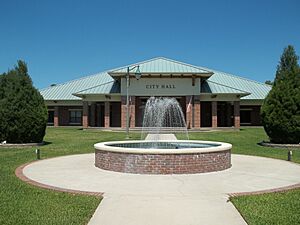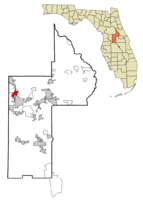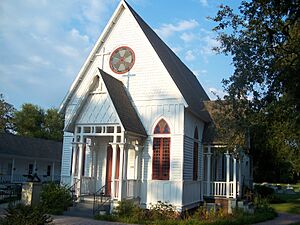Fruitland Park, Florida facts for kids
Quick facts for kids
Fruitland Park, Florida
|
|
|---|---|
| City of Fruitland Park | |
 |
|
| Motto(s):
The Friendly City
|
|

Location in Lake County and the state of Florida
|
|
| Country | United States of America |
| State | Florida |
| County | Lake |
| Incorporated | May 25, 1927 |
| Government | |
| • Type | Commission-Manager |
| Area | |
| • Total | 7.27 sq mi (18.82 km2) |
| • Land | 6.96 sq mi (18.03 km2) |
| • Water | 0.30 sq mi (0.79 km2) |
| Elevation | 66 ft (20 m) |
| Population
(2020)
|
|
| • Total | 8,325 |
| • Density | 1,195.61/sq mi (461.63/km2) |
| Time zone | UTC-5 (Eastern (EST)) |
| • Summer (DST) | UTC-4 (EDT) |
| ZIP code |
34731
|
| Area code(s) | 352 |
| FIPS code | 12-24975 |
| GNIS feature ID | 2403668 |
Fruitland Park is a city located in Lake County, Florida, in the United States. It's part of the larger Orlando area. In 2020, about 8,325 people lived there.
Contents
History of Fruitland Park

Fruitland Park existed even before the American Civil War. However, it wasn't always called Fruitland Park. Its first name was Gardenia. The very first settler was M. Calvin Lee, who started a citrus grove. After the war, P.S. Bouknight, a relative of the Lee family, claimed 40 acres (about 160,000 square meters) of land near Mirror Lake. This was called "homesteading."
In 1875, the State of Florida sent Captain Kendricks to the northern United States. His job was to tell people about the good things about living in Florida. Major Orlando P. Rooks and his wife, Josephine, moved to Fruitland Park in 1877. They built their first home on Crystal Lake. Their son, Frederic, was the first white child born there in 1882.
Major Rooks named the town Fruitland Park after the Fruitland Nurseries in Georgia. These nurseries were owned by his friend, J. P. Berckmann. The main street in Fruitland Park, Berckmann Street, is also named after him.
Name Changes and Confusion
For a while, the town's name caused confusion. Postal workers wouldn't accept "Fruitland Park" because another town in Florida was already called "Fruitland." So, the name was changed to Gardenia in 1884.
However, the Florida Railroad had already printed maps and schedules using "Fruitland Park." They refused to use the new name, Gardenia. This meant that mail went to Gardenia, but all packages and freight went to Fruitland Park. This was very confusing for everyone!
Finally, in 1888, people sent a request to the postal authorities. They asked to change the name back to Fruitland Park. The request was approved, and the town has been Fruitland Park ever since.
Early Community and Incorporation
On December 20, 1884, the first community church was started in Fruitland Park. It was called the Community Church, a Methodist Episcopal church. The church building was constructed between 1886 and 1887. This building later burned down in 1934 but was rebuilt in 1935. Today, that building is owned by the United Pentecostal Church.
Fruitland Park officially became a city on May 25, 1927. This means it received a special permission, called a charter, from the state.
Fruitland Park is also home to the oldest dirt kart track in America. This 1/8-mile clay oval track has hosted go-kart races every Saturday night since it opened in 1958.
Growth and Expansion of The Villages
On December 10, 2013, a company called The Villages of Lake-Sumter Inc. bought land in Fruitland Park. They paid $8 million for the property. After buying the land, they worked with the city to add the land to Fruitland Park. They also changed its zoning rules.
This land is now being used to build 2,038 new homes for The Villages community. This large project was expected to be finished around 2016. The city of Fruitland Park was set to earn about $13 million from fees and building permits because of this expansion. It also gets ongoing tax money from the new homes.
Geography of Fruitland Park
Fruitland Park is located at 28°51′31″N 81°54′47″W / 28.858571°N 81.913114°W.
The United States Census Bureau collects information about places in the U.S. According to their data, the city covers a total area of about 9.5 square kilometers (3.7 square miles). Most of this area, about 7.6 square kilometers (2.9 square miles), is land. The rest, about 1.9 square kilometers (0.7 square miles), is water. This means about 20% of the city's area is water.
Population and Demographics
| Historical population | |||
|---|---|---|---|
| Census | Pop. | %± | |
| 1930 | 270 | — | |
| 1940 | 362 | 34.1% | |
| 1950 | 551 | 52.2% | |
| 1960 | 774 | 40.5% | |
| 1970 | 1,359 | 75.6% | |
| 1980 | 2,259 | 66.2% | |
| 1990 | 2,754 | 21.9% | |
| 2000 | 3,186 | 15.7% | |
| 2010 | 4,078 | 28.0% | |
| 2020 | 8,325 | 104.1% | |
| U.S. Decennial Census | |||
The population of Fruitland Park has grown a lot over the years. The table above shows how many people lived in the city during different census years. A census is a count of the population that happens every ten years.
Population Details from Recent Censuses
| Race | Pop 2010 | Pop 2020 | % 2010 | % 2020 |
|---|---|---|---|---|
| White (NH) | 3,234 | 6,555 | 79.30% | 78.74% |
| Black or African American (NH) | 373 | 630 | 9.15% | 7.57% |
| Native American or Alaska Native (NH) | 7 | 22 | 0.17% | 0.26% |
| Asian (NH) | 57 | 144 | 1.40% | 1.73% |
| Pacific Islander or Native Hawaiian (NH) | 13 | 18 | 0.32% | 0.22% |
| Some other race (NH) | 4 | 39 | 0.10% | 0.47% |
| Two or more races/Multiracial (NH) | 77 | 225 | 1.89% | 2.70% |
| Hispanic or Latino (any race) | 313 | 692 | 7.68% | 8.31% |
| Total | 4,078 | 8,325 |
The table above shows the different racial groups living in Fruitland Park. "NH" means "Non-Hispanic," which helps to show racial groups separately from people who identify as Hispanic or Latino.
In 2020, the city had 8,325 people. These people lived in 3,755 households, and 2,639 of these were families. A household means all the people living in one home. A family means two or more people related by birth, marriage, or adoption living together.
Notable People
- Lillian Vickers-Smith, known as the first female sports editor in the United States.
See also
 In Spanish: Fruitland Park para niños
In Spanish: Fruitland Park para niños

